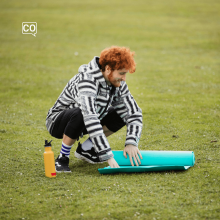Empezar (to start) - Futuro perfecto, indicativo (Future Perfect, indicative) - Spanish

Empezar - Conjugation of to start in Spanish: Conjugation table, examples and exercises in the future perfect, indicative tense (Futuro perfecto, indicativo).
Futuro perfecto, indicativo (Future Perfect, indicative)
All conjugations and tenses: Empezar (to start) - conjugation and tenses - (Spanish)
Syllabus: Spanish lesson - Fechas del calendario y días festivos. (Calendar dates and holidays)
Conjugation of to start in Futuro perfecto
- yo habré empezado I will have started
- tú habrás empezado You will have started
- él/ella habrá empezado he will have started
- nosotros/nosotras habremos empezado we will have started
- vosotros/vosotras habréis empezado You will have started
- ellos/ellas habrán empezado they will have started
Example phrases
- Para cuando llegues, yo habré empezado a cocinar. By the time you arrive, I will have started to cook.
- Estoy seguro de que tú habrás empezado a estudiar para entonces. I am sure that you will have started studying by then.
- Él habrá empezado su nuevo trabajo para el próximo lunes. He will have started his new job by next Monday.
- Nosotras habremos empezado a decorar la casa antes de Navidad. We will have started to decorate the house before Christmas.
- Vosotros habréis empezado el proyecto antes del verano. You all will have started the project before summer.
- Ellas habrán empezado su viaje para esa fecha. They will have started their trip by that date.
Exercise: Conjugate the verbs - empezar (to start)
Instruction: Choose the correct word, read the sentence out loud and translate.
Show answers Show translationEmpezar (Futuro perfecto, indicativo)
1. Vosotros ... el proyecto antes del verano.
2. Ellas ... su viaje para esa fecha.
3. Para cuando llegues, yo ... a cocinar.
4. Nosotras ... a decorar la casa antes de navidad.
5. Estoy seguro de que tú ... a estudiar para entonces.
6. Él ... su nuevo trabajo para el próximo lunes.